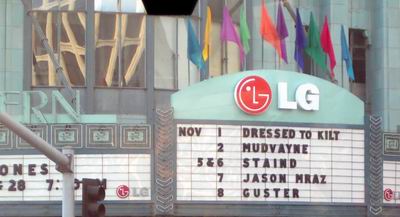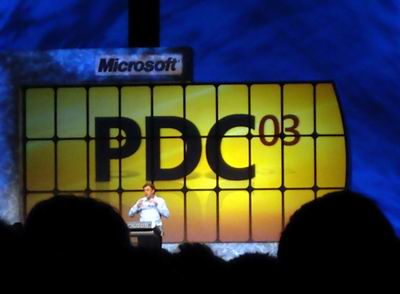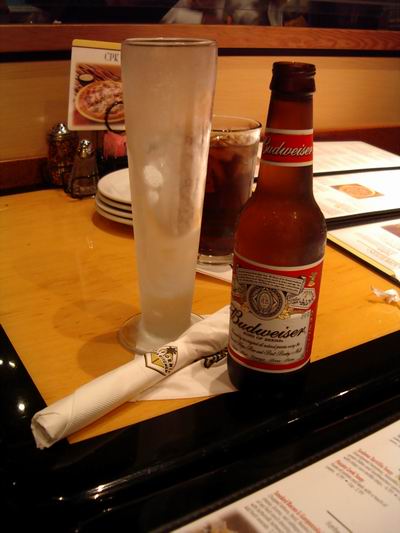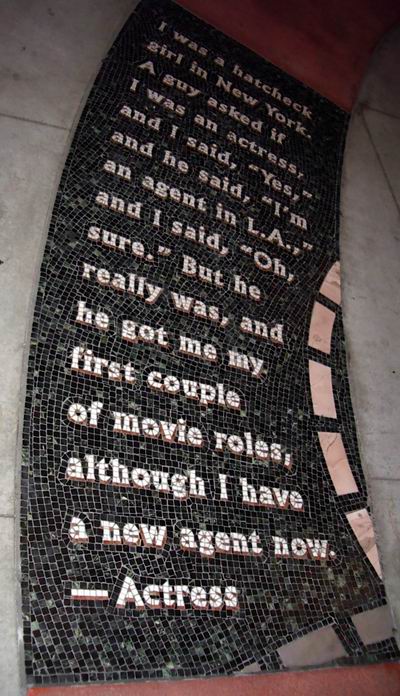Bill Speaks - and Longhorn is good
After the profundity of yesterday, back to the pictures and captions... Got on the bus at 6:30 am for an interesting ride to the convention centre. We've never been the same way twice..

On the way there we went past a theatre showing some very funny stuff...

And so to the convention. And Mr. Gates struts his stuff:

Now, as anyone will tell you I'm not easily impressed. New whiz bang things come along and I go "Yeah, but what does it do for me? - I'm still using the same 5% of the features of Word which I've been using for the last ten years." (I suppose this is not quite true, I'm a bit of a sucker for the latest gadget - but stay with me on this). Longhorn has stuff which really makes me go "I could really use that". Loads of stuff. I went round the Getty museum yesterday. It looks fantastic from the outside. Everything around it has been put there for a good reason. And there is some really neat stuff inside. That's Longhorn. I'm pleased to have been here at the start of something this big. Because it will be big.
After Bill started things off there was a kind of double act which presented features and showed how easy it will be to use them from software. After yesterdays musing on the nature of Computer Science this threw me a bit. There are issues about design, complexity and knowing what happens underneath, but now I'm not sure just what you need to know to use this stuff. And what is the relevance of hardware knowledge to all this? I've no idea just at the moment, my only feeling just right now is that we need to expose our students to this stuff.
The hardware question was kind of answered in a superb talk by a chap who has been implementing Microsoft Spot devices. These are a bit like "super pagers" in that they subscribe to services and receive messages from FM transmitters around the country. They are based on a couple of chips, rather fetchingly called "Stan" and "Ollie". Stan does all the radio stuff whilst Ollie is an ARM chip who runs the programs.
They are using the .NET framework to make this go, in a system with only a few hundred K of memory (around a thousandth of the memory in your PC). It was very refreshing to hear a chap talking about memory limitations, processor speed issues, battery life and interference. Then at the end he put the icing on the cake by announcing that the devices would be available as tiny controllers for use in teaching. Dude! I'm not convinced of the business case for the Spot devices - my Smartphone can do the same kind of thing with SMS messages - but Microsoft now have a .NET embedded device which you can program at a high level and put into just about anything. This could be as big as Longhorn, but perhaps over a slightly longer term.
Rounded the day off with a talk about the Indigo part of Longhorn. Indigo is the bit that links systems together in Longhorn. You send a message to another system to make it do something for you. Very persuasive talker this chap. Some good one liners. Everything in the future will be service based. This is good stuff. I've spent enough time grappling with objects to know that this is the way to go. And it is all going into our Software Engineering course....
Got back to the room and then out for a pizza. Make mine a tall and frosty one (obviously)

And finally, walking around outside the hotel we come across some motivational paving.

I feel sorry for the agent. More techno babble tomorrow...

On the way there we went past a theatre showing some very funny stuff...

And so to the convention. And Mr. Gates struts his stuff:

Now, as anyone will tell you I'm not easily impressed. New whiz bang things come along and I go "Yeah, but what does it do for me? - I'm still using the same 5% of the features of Word which I've been using for the last ten years." (I suppose this is not quite true, I'm a bit of a sucker for the latest gadget - but stay with me on this). Longhorn has stuff which really makes me go "I could really use that". Loads of stuff. I went round the Getty museum yesterday. It looks fantastic from the outside. Everything around it has been put there for a good reason. And there is some really neat stuff inside. That's Longhorn. I'm pleased to have been here at the start of something this big. Because it will be big.
After Bill started things off there was a kind of double act which presented features and showed how easy it will be to use them from software. After yesterdays musing on the nature of Computer Science this threw me a bit. There are issues about design, complexity and knowing what happens underneath, but now I'm not sure just what you need to know to use this stuff. And what is the relevance of hardware knowledge to all this? I've no idea just at the moment, my only feeling just right now is that we need to expose our students to this stuff.
The hardware question was kind of answered in a superb talk by a chap who has been implementing Microsoft Spot devices. These are a bit like "super pagers" in that they subscribe to services and receive messages from FM transmitters around the country. They are based on a couple of chips, rather fetchingly called "Stan" and "Ollie". Stan does all the radio stuff whilst Ollie is an ARM chip who runs the programs.
They are using the .NET framework to make this go, in a system with only a few hundred K of memory (around a thousandth of the memory in your PC). It was very refreshing to hear a chap talking about memory limitations, processor speed issues, battery life and interference. Then at the end he put the icing on the cake by announcing that the devices would be available as tiny controllers for use in teaching. Dude! I'm not convinced of the business case for the Spot devices - my Smartphone can do the same kind of thing with SMS messages - but Microsoft now have a .NET embedded device which you can program at a high level and put into just about anything. This could be as big as Longhorn, but perhaps over a slightly longer term.
Rounded the day off with a talk about the Indigo part of Longhorn. Indigo is the bit that links systems together in Longhorn. You send a message to another system to make it do something for you. Very persuasive talker this chap. Some good one liners. Everything in the future will be service based. This is good stuff. I've spent enough time grappling with objects to know that this is the way to go. And it is all going into our Software Engineering course....
Got back to the room and then out for a pizza. Make mine a tall and frosty one (obviously)

And finally, walking around outside the hotel we come across some motivational paving.

I feel sorry for the agent. More techno babble tomorrow...


0 Comments:
Post a Comment
<< Home